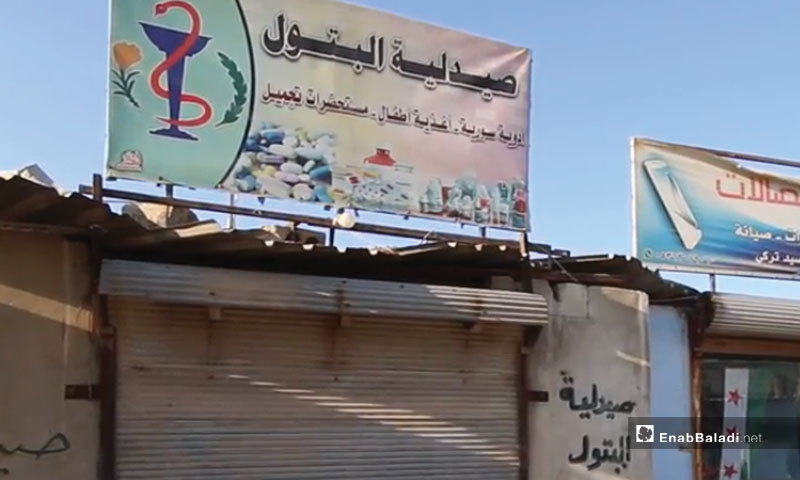



The Idlib Health Directorate, in collaboration with the Pharmacists’ Union, issued a decree requiring pharmacists in the governorate to obtain licenses in order to continue working in their pharmacies.
The license requires a university degree in pharmacy, through which the pharmacy is recognized by the Pharmacists’ Union. The decision puts dozens of pharmacy employees in threat of inevitable closure, if the pharmacy degree is not submitted in application for a license.
People who own or work in pharmacies rent degrees from other pharmacists to license their stores.
The decision was highly controversial, and was faced with a strike by pharmacy workers in al-Karama, Atmah and Aqrabat IDP camps in the northern Idlib countryside. On June 27, pharmacy workers in al-Karama IDP camp also staged a sit-in.
According to the Enab Baladi correspondent, the protestors considered the decision to be unjust, and aiming to raise funds from pharmacy workers. Meanwhile, the Pharmacists’ Union denied this claim, and considered the measure to be consumer protection and risks to the health of individuals away from medical, scientific and legal controls.
Issam Ali, who works in a pharmacy in the village of Aqrabat, is taking part in the strike to protest the licensing decision. He expressed his fear that the decision will lead to the closure of the pharmacy in which he works.
Speaking to Enab Baladi, Issam said, “They asked us for licenses and gave us five days before the pharmacy was shut down. The cost of the closure can reach US $200 that the pharmacist has to pay, whether they like it or not.”
“Their demand is for the owner of the pharmacy to have a pharmacy degree, which is very difficult to obtain, as most pharmacists work in organizations or have left the country,” he added.
According to Issam, the license requires a year’s lease for the store. He explained, “We asked for six months to settle our affairs and find a pharmacist to rent us a degree. We talked to people at the Health Directorate, but we did not reach a conclusion.”
Abu Hussam, who asked not to be named for privacy reasons, also works in a pharmacy in al-Karama IDP camp, and faces the same concerns that Issam Ali does.
Speaking to Enab Baladi, Abu Hussam indicated that licensing requests “cannot be met, as there are no degree holders covering the pharmacies.” He continued, “In al-Karama and Atmah camps, there are 35 pharmacies and only one pharmacist. Some people who work in pharmacies managed to get degrees for the purpose of licensing.”
A member of the Idlib Pharmacists’ Union, Mohamed Qassas, explained to Enab Baladi the details of the decision to license pharmacies. He denied that the decision is authoritarian, or that it is formalistic and designed to raise money.
Qassas stressed that the Union has been seeking to license pharmacies for years, adding, “Our view is that these pharmacies are in violation, and these pharmacists are blood traders who are not scientifically qualified to run pharmaceutical facilities.”
He denied that the number of pharmacists in the region is not sufficient to cover the need for pharmacy degrees. “The number of pharmacists who joined the Union since the beginning of this year until June is 107, and 180 joined last year.”
“One of the most basic rights of citizens is to enter a pharmaceutical facility and deal with a scientifically qualified person to provide sound medical service, away from trading at the cost of citizen’s interest,” he added.
He described those working in pharmacies without a license as “profiteers” and called for their elimination, in order to provide an environment suitable for the work of graduates with expertise.
On the decision, Qassas distinguished between unlicensed pharmacies run by pharmacists, which can be licensed, and “drug stores” which he vowed to face with severe sanctions.
The decision to license pharmacies in Idlib comes under a general trend to control the medical sector and its institutions.
The Directorate of Health Idlib had issued a decision on March 7, 2019, which prevented medical staff from practicing the profession without obtaining a license granted by the Directorate.
The Health Directorate’s decision states that no one may practice the professions of medicine, dentistry, pharmacy, midwifery, nursing or technical assistance unless they have a degree in their profession. They must also be registered with the Directorate of Health and licensed to practice the profession, permanently or temporarily.
According to the deputy of Idlib’s Health Directorate, Mustafa al-Eido, in an earlier interview with Enab Baladi, the decision aims primarily to regulate the work of medical staff in Idlib, which is outside the control of the Syrian regime. It also aimed at the detection of doctors, nurses and other medical staff with false or fraudulent certificates, and excluding them from work in the medical sector.
He pointed out that from the date of the decision until June of this year, the Directorate granted 238 licenses to “practice the profession” for medical staff of different specialties.
if you think the article contain wrong information or you have additional details Send Correction